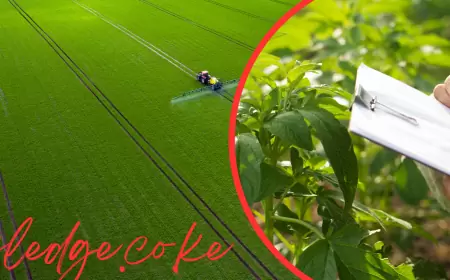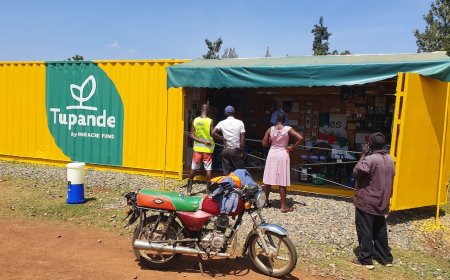Plant Operator Course in Kenya: Requirements, Fees, and Where to Study 2024
Interested in working with heavy machinery? Learn about the plant operator course in Kenya, including fees and admission requirements. Choose from reputable institutions offering quality training.

Are you fascinated by heavy machinery and eager to play a pivotal role in Kenya's burgeoning infrastructure landscape? The field of plant operation could be your calling! In this in-depth blog post, we're delving into the nitty-gritty of becoming a plant operator in Kenya. From understanding what it takes to maneuver colossal machines like excavators and bulldozers, to unearthing the pathways to this exciting career, we've got you covered.
Plant operators are the maestros of heavy machinery, crucial in industries such as construction and agriculture. Their expertise ensures the safe and efficient operation of complex equipment, a skill that's increasingly in demand in Kenya's dynamic infrastructure sector. Whether it's sculpting landscapes, erecting monumental structures, or paving new roads, plant operators are at the heart of these transformative projects.
But what exactly does it entail to become a plant operator in Kenya? What are the prerequisites, how much will it cost, and where can you acquire these sought-after skills? In the following sections, we'll guide you through everything you need to know: the essential requirements, course durations, fees, and the top institutions where you can kickstart your journey in this field. Get ready to embark on a path that not only promises a rewarding career but also plays a vital part in shaping Kenya's future. Let's dig in!
What is a Plant Operator?
Stepping into the boots of a plant operator means embracing a role that's both challenging and rewarding. In simple terms, a plant operator is someone who expertly handles heavy machinery - think of excavators, bulldozers, and cranes. It's a job that requires a keen eye, steady hands, and a deep understanding of how these powerful machines work. Plant operators are the backbone of projects that shape our surroundings - from erecting towering buildings to paving roads that connect communities. In Kenya, where infrastructure is a growing sector, these professionals are more crucial than ever. They're the ones who transform blueprints into reality, ensuring every scoop and lift is precise and safe.
Why Become a Plant Operator?
Now, you might wonder, "Why should I consider becoming a plant operator?" Well, the answer lies in the numerous opportunities and rewards this career offers.
-
High Demand: As Kenya strides forward in infrastructure development, the need for skilled plant operators is soaring. This growth translates to abundant job opportunities for you in the construction industry.
-
Good Salary: Everyone wants a job that not only fulfills them but also provides financial stability. In Kenya, a plant operator can earn a handsome salary, with experienced individuals making around Kshs. 45,000 per month. That's a respectable income in a field that's only set to grow!
-
Variety of Projects: Imagine having a career where no two days are the same. As a plant operator, you could be working on a multitude of projects - from constructing high-rise buildings to laying down new highways. This variety ensures that your job stays exciting and allows you to continually develop new skills.
Challenges and Future of Plant Operation in Kenya
Of course, every career has its challenges, and plant operation is no different. The work often involves long hours and physical labor, sometimes under demanding conditions. It's a role that requires constant vigilance and a commitment to safety.
But looking ahead, the future for plant operators in Kenya is bright. The country's focus on developing its infrastructure means that skilled operators will be in high demand. This growing sector not only promises job security but also offers opportunities for career advancement and skill enhancement. As Kenya continues to grow, so will the opportunities for those who operate the machines that make this growth possible.
Plant Operator Course Requirements
General Requirements
Embarking on a journey to become a plant operator in Kenya begins with understanding the prerequisites. These requirements are your first steps towards a career filled with gigantic machines and impactful work. While specific criteria may vary slightly between institutions, there's a general checklist that most training centers adhere to:
- National ID: A valid Kenyan National ID is a must for registration. It's your official ticket to enter the world of plant operation courses.
- Driving License: Here's a key point - a valid driver's license is non-negotiable. After all, operating heavy machinery is akin to driving on a much larger scale. If you don't have one yet, don't worry! Many institutes offer a driving course to get you up to speed.
- Passport Size Photos: Get ready for your close-up! You'll need 4-5 colored passport-size photos for documentation purposes.
- Training Boots: Safety first! Since you'll be working in environments that require protective gear, sturdy training boots are essential for all practical sessions.
- Good Physical Health: Operating heavy machinery isn't just about skill; it's also about physical capability. Good health is vital to ensure safety and efficiency on the job.
- Basic Math and Reading Skills: Understanding equipment manuals, safety guidelines, and operational instructions is crucial. Hence, fundamental math and reading skills are a must.
Specific Requirements by Institutions
Different institutions might have additional specific requirements. Here are a couple of examples:
- Kenya Institute of Highways and Building Technology (KIHBT): To enroll in KIHBT, you should have attained a mean grade of D Plain in your KCSE. This institution, known for its rigorous training, conducts intakes every two months at its Ngong Campus.
- Nairobi Institute of Technology (NIT): Here, the bar is set a bit higher. You need an overall mean grade of C (Plain) in your KCSE, with a minimum grade of C- in English or Kiswahili. This reflects NIT's commitment to ensuring its trainees have a strong foundational education.
Each institution aims to equip you with the skills and knowledge required in the field, but they also ensure that you start with a certain level of preparedness. So, it's crucial to check the specific requirements of the institution you're interested in.
Plant Operator Course Fees
When it comes to financing your education, understanding the course fees is crucial. In Kenya, the cost of plant operator courses can vary based on several factors, including the reputation of the institution, the number of machines you'll be trained on, and the course's length.
-
General Fee Range: Typically, the fees for plant operator courses in Kenya fall between Kshs. 60,000 and Kshs. 120,000. This range gives you a ballpark figure to start planning your finances.
-
Institution-Specific Fees: For instance, at the Sensei Institute of Technology, you'll find a standard course priced at Kshs. 68,000 for a 1-month program, covering three machines. If you're aiming for more extensive training, their 2-month premium course costs Kshs. 104,000 and includes training on six machines.
Where to Study Plant Operator Course
Choosing the right institution is a critical step in your journey to becoming a plant operator. Kenya boasts several top-notch schools that offer comprehensive training in this field. Let's look at some of the leading institutes where you can gain the skills and certification needed to excel as a plant operator:
-
Kenya Institute of Highways and Building Technology (KIHBT): KIHBT stands out as a premier government-owned institution offering plant operator courses. Located at its Ngong Campus, KIHBT provides hands-on training on various road construction equipment and machinery. With intakes every two months, this institute is known for its high-quality training and practical approach.
-
Sensei Institute of Technology: With campuses in Nairobi and Nakuru, Sensei Institute is another excellent choice for plant operator training. They offer both standard and premium courses, allowing you to choose the extent and depth of your training. Completing a course here earns you an NTSA-endorsed license for the machines you've mastered.
-
International Plant Machinery Technical Training Institute (IPMTTI): As an NTSA-approved driving school, IPMTTI offers extensive technical training in plant operation. Their focus on both theoretical and practical aspects of operating earthmoving and lifting machines makes them a great choice for comprehensive learning.
-
Nairobi Institute of Technology (NIT): NIT provides a well-rounded education in heavy plant and machine operation. Their program not only imparts practical skills but also emphasizes safety and efficiency in operation.
-
Kilimambogo Institute of Professional Earthmovers (KIHBTECH): Located in Thika, KIHBTECH offers a detailed plant operator course with modern training facilities. They focus on machinery typically used in construction sites, providing a real-world learning experience.
Each of these institutions has its unique strengths and focuses, so it's important to consider what each one offers and how it aligns with your career goals. Researching and visiting these institutes, if possible, will give you a better sense of which one is the best fit for you.
READ ALSO: Diploma in Nursing Kenya Requirements, Qualifications, And Universities, Colleges Offering Them
Conclusion
Becoming a plant operator can be rewarding for individuals interested in working with heavy machinery. By enrolling in a plant operator course, you can gain the necessary skills and qualifications to operate various equipment in construction and agricultural settings. Remember to choose a reputable institution that offers comprehensive training and practical experience. With the high demand for plant operators in Kenya, completing a plant operator course can open up numerous job opportunities in the industry.
FAQS
What are the different types of plant operator courses in Kenya?
Many different plant operator courses are available in Kenya, each with its focus. Some of the most common types of plant operator courses include:
- Basic plant operator course: This course covers the basics of plant operation, including safety, maintenance, and basic machine operation.
- Advanced plant operator course: This course builds on the introductory plant operator course and covers more advanced topics, such as machine troubleshooting and specialized techniques.
- Specialization course: This course focuses on a specific type of plant operation, such as excavator or crane operation.
What are the requirements for a plant operator course in Kenya?
The requirements for a plant operator course vary from institution to institution. However, some of the most common requirements include:
- National ID
- Driving license
- 4-5 colored passport-size photos
- Training boots
- Good physical health
- Basic math and reading skills
How long does it take to complete a plant operator course in Kenya?
The time it takes to complete a plant operator course depends on the institution and your chosen course. However, most plant operator courses take between 2 and 6 months to complete.
What are the costs involved in taking a plant operator course in Kenya?
The costs of taking a plant operator course vary from institution to institution. However, the average cost of a plant operator course in Kenya is Kshs. 60,000 - Kshs. 120,000.
Where can I take a plant operator course in Kenya?
Many institutions in Kenya offer plant operator courses. Some of the best include:
- Kenya Institute of Highways and Building Technology (KIHBT)
- Sensei Institute of Technology
- International Plant Machinery Technical Training Institute (IPMTTI)
- Ganatra Plant & Equipment Training Institute
- Lake Naivasha Institute Plant & Equipment Training
What are the job prospects for plant operators in Kenya?
The job prospects for plant operators in Kenya are excellent. The demand for plant operators is growing as the country's infrastructure develops. This means plenty of job opportunities are available for qualified plant operators.
What are the salary prospects for plant operators in Kenya?
The salary prospects for plant operators in Kenya vary depending on the experience and qualifications of the operator. However, plant operators can earn a good salary, with some experienced operators earning over Kshs. 100,000 per month.
What are the benefits of becoming a plant operator in Kenya?
There are many benefits to becoming a plant operator in Kenya. Some of the most common benefits include:
- Good salary prospects
- Variety of job opportunities
- Challenging and rewarding work
- Opportunity to learn new skills
What are the challenges of becoming a plant operator in Kenya?
There are a few challenges to becoming a plant operator in Kenya. Some of the most common challenges include:
- Long hours
- Hard physical work
- Dangerous working conditions
- Need for specialized skills
What is the future of plant operation in Kenya?
The future of plant operation in Kenya is bright. The demand for plant operators is expected to grow as the country's infrastructure develops. This means plenty of job opportunities will be available for qualified plant operators in the coming years.
Disclaimer
The information provided in this article is for general guidance purposes only. It's essential to conduct further research and verify the details with the respective institutions offering the plant operator course. The availability of courses, requirements, and fees may vary over time, so it's crucial to contact the institutions directly for the most up-to-date information.












































































